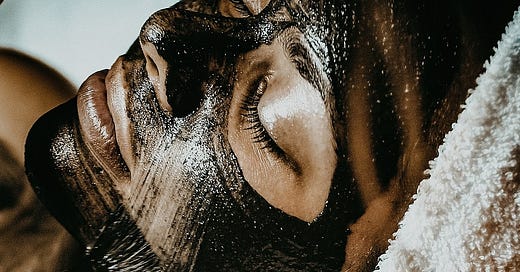Protecting the planet's plants, animals and ecosystems, and repairing the damage done to them by humans, will require about $700 billion a year. We spent 5.6 trillion dollars in 2022 on so-called Wellness products, which could have covered 8 years of nature restoration.
Fake news, false claims, exaggerated results, the Wellness industry abounds with them. We spend huge sums on stuff that either doesn’t work or is actually harmful. We follow trends, we listen to uninformed and mercenary ‘influencers’ and we empty our wallets hoping the new big thing will make us healthier and fitter. It’s all nonsense.
Let’s have a look at some scientific research headlines.
Food supplements :
Nutrients from food, not supplements, linked to lower risks of death, cancer. Fang Fang Zhang, M.D., Ph.D., associate professor at the Friedman School of Nutrition Science and Policy at Tufts University
Some plant-based food supplements contain high levels of cancer causing agents, study suggests, researchers of Wageningen University
Health benefits of broccoli require the whole food, not supplements. Scientists in the Linus Pauling Institute at Oregon State University
Vast majority of dietary supplements don't improve heart health or put off death, study finds. Johns Hopkins Medicine researchers
"After reviewing the literature of the prevalence of dietary supplement use, it seemed to show that use of dietary supplements is increasing, but it does not appear to be correlated with improved public health," says Chiou of National Sun Yat-Sen University.
Dietary supplements linked with severe health events in children, young adults, Harvard T.H. Chan School of Public Health.
And so on and so forth. What is even worse is that many of these so-called supplements don’t contain much or even any of the ingredients that are on the label.
“Just 11 percent of nearly 60 tested dietary supplements actually contain an accurate amount of key ingredients listed on the label, scientists report July 17 in JAMA Network Open. Forty percent did not contain a detectable amount of the ingredients at all.”
Apart from pouring this sort of stuff into our bodies with our habitual and naive ‘trust the label’ approach we also plaster ourselves with beauty products.
Mixed chemicals in beauty products may harm women's hormones. Source: George Mason University
Chemicals from hair and beauty products impact hormones, especially during pregnancy. Source: Rutgers University
Beauty products with fluorinated ingredients may also contain PFAS. Source: American Chemical Society
Superbugs including E. coli and Staphylococci have been found in more than nine out of ten in-use beauty products. Source: Aston University.
And on and on.
While researching this article I discovered “Wellness real estate”. People spent 398 billion dollars on this. I was fascinated to discover what it is. The Global Wellness Institute defines it as “homes that are proactively designed and built to support the holistic health of their residents".” Seriously? What the hell are the rest of us living in then? Does this really mean that we have to pay a supplement to live in a healthy home? Of course it does, I’ve written about the obscenity of Shoddy new built housing.
Then we have “Wellness tourism” which is “travel associated with the pursuit of maintaining or enhancing one's personal wellbeing.” The top destinations are Bangkok, Istanbul, Montreux, Barbados and Florida. Fine if you live there, a climate-destroying flight in a jet aircraft if you don’t. You’ll probably need your smart ride-on or auto-follow suitcase if you’re heading off. If you haven’t heard about these then check out the Airwheel SE3 Smart Riding Scooter Suitcase.
Equally stunning is the 1,079 billion dollars we spent on healthy eating, nutrition, and weight loss.
The whole thing is an industry that makes things up as it goes along. "We suspect that those companies selling benfotiamine (a popular vitamin supplement) have poisoned much of the recent literature in an attempt to bestow it with properties that it does not have" Dr Lucien Bettendorff of the Center for Cellular and Molecular Neurobiology at the University of Liège. Just one example of what is basically fraud.
Don’t need the Wellness industry and better off without them.
Let me start with our skin and cosmetics. We’ve been putting stuff on it for millennia and we’ve been getting wrong all this time. The Romans added lead sulphide, mercury and arsenic to their beauty products. Today we can still find mercury in skin products as well as :
Formaldehyde, a known carcinogen.
Paraformaldehyde, a type of formaldehyde.
Methylene glycol, a type of formaldehyde.
Quaternium 15, which releases formaldehyde.
Mercury, which can damage the kidneys and nervous system.
Dibutyl and diethylhexyl phthalates, which disrupt hormones and damage the reproductive system.
Isobutyl and isopropyl parabens, which disrupt hormones and harm the reproductive system.
The long-chain per- and polyfluoroalkyl substances known as PFAS, which have been linked to cancer.
M- and o-phenylenediamine, used in hair dyes, which irritate and sensitize the skin, damage DNA and can cause cancer.
source: Environmental Working Group
We spend out each year on these products ignoring the fact that the skin isn’t just something that holds all the wobbly bits inside it is actually an organ in itself, the biggest in fact. It also has it’s own microbiome. We know that a healthy diet encourages healthy skin and skin functions yet we insist on buying creams and lotions that actively wreck the skin’s microbiome. We kill off the things that keep the skin healthy, we trust the hype and marketing and ignore the science.
I’ll start a new trend. Climate adaptive cosmetics, how to stay looking good when faced with a wildfire, hurricane or flood. Cynical yes, but given what the Wellness industry gets up to it’s probably going to happen.
What should we do?
Stop wasting our money for a start. Think before we spend. Most of the real solutions to health and well-being are either free or cheap.
You want to live longer and sort out your blood pressure? Get out and do some community volunteer work, go and help some people.
You want to avoid dementia? Do some community volunteer work.
You want to improve your mental and physical health and have better life satisfaction? Do some community volunteer work.
Perhaps you want to have a clear skin, bright eyes and a moist nose, (no sorry that’s dogs)? Well we come back to the old ‘I am what I eat’ thing. Fresh, locally sourced fruit and vegetables and aiming to increase our dietary diversity do all the above. There are multiple examples of studies that show it’s better to get our essential vitamins and minerals through good diet rather than messing around with dietary supplements. We don’t know what’s in them nor how much they may contain of any particular supplement.
“I don’t recommend other supplements,” Appel, Johns Hopkins nutrition expert says. “If you follow a healthy diet, you can get all of the vitamins and minerals you need from food.”
If you want to improve your skin well get some good quality sleep. Strangely enough this was shown up in research done by people working for Estée Lauder.
Are you worried about skin allergies? Dietary fibre could be your BFF here.
Soap? Don’t use it, except for handwashing. Soap free showers are the way to go. Little by little your skin microbiome will restore itself and your skin will become more healthy. “As I gradually used less and less (soap), I started to need less and less,” he writes. “My skin slowly became less oily, and I got fewer patches of eczema. I didn’t smell like pine trees or lavender, but I also didn’t smell like the oniony body odour that I used to get when my armpits, used to being plastered with deodorant, suddenly went a day without it.” James Hamblin, Yale School of Public Health.
Are you worried about your bone health? Again it’s the diet that counts. Dietary Calcium Is Better Than Supplements At Protecting Bone Health.
Pollution and all the rest.
Chronic stress, all the varied forms of pollution, air, water, noise etc mess with our health. Spending 70-80% of our time indoors does the same. We live in sick buildings built by an unethical building industry. None of this is good for our well-being. Just imagine how much of all that we could change if we spent our 5.6 trillion dollars doing it.
The other major problem is that the ‘Wellness industry’ is very elitist. You can have ‘wellness’ if you’ve got the money, if not you’re stuffed.
The etymology of ‘well’ is to do something in a satisfactory manner, the Wellness industry doesn’t even manage this. The industry promotes the idea of ‘holistic’ health which is basically a tautology. The word ‘healthy’ means "wholeness, a being whole, sound or well.” A truly holistic approach to health is very different to that proposed by said industry. It involves restructuring our societies, our food, building and water industries. It means transforming our local communities and eliminating all those things that provoke chronic stress.
A holistic approach will also take into account that we are different to each other, ‘one person’s meat another person’s poison.’ We are, all of us, genetically predisposed to eating starch and fermented foods, within that we all have different needs and different capacities to digest various foods. For example, some people get bloated after eating lentils and chickpeas, others don’t.
To finish, it’s been fascinating looking at how we are increasingly worried about our longevity. It looks like another of our ‘quantity rather than quality’ nonsense. People are obsessing about longevity while literally engaging in activities that destroy the biosphere and all the other stuff on which our survival depends. Longevity products and treatments aren’t going to help much when you get hit by a heatwave, hurricane, wildfire or flood. To those people who think that ‘it won’t happen to me’ I’d say think again, all the above are increasing in frequency and severity, they are spreading into places previously relatively untouched. The odds are changing and not in our favour.








I agree 100% and love how reducing our use of supplements, cosmetics, and personal hygiene products is good for our health and is also part of degrowth which is absolutely essential for planetary health.
Good stuff. Worth saying that there is good evidence that at higher latitudes, with shorter day lengths in winter, vitamin D supplements can be important, particularly for folk with darker skins. Also, recommended Vitamin B12 levels in the UK are now looking low compared with some countries. In Japan the government issues free B12 supplements to all its citizens, something which is now thought to be related to their low rates of dementia, although this has not been demonstrated clearly yet.